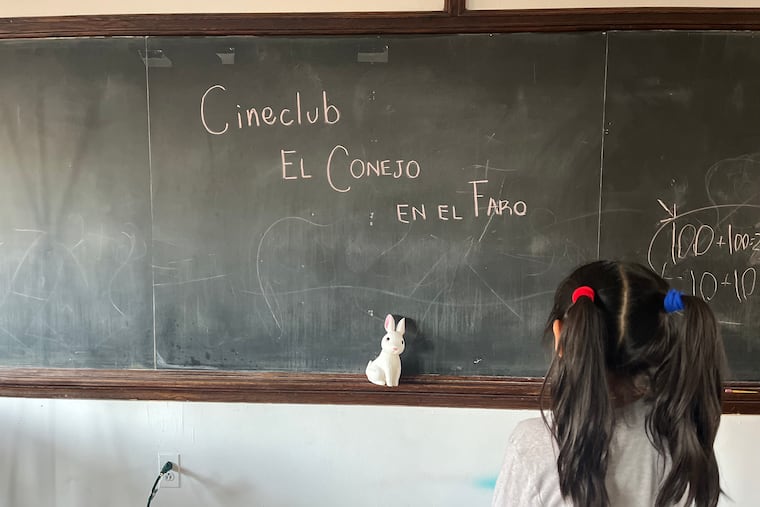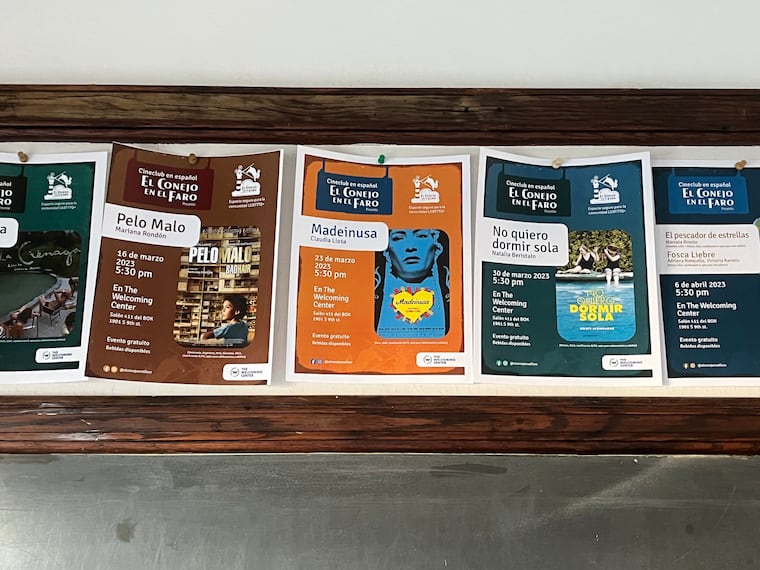Free Spanish language film club El Conejo en el Faro connects community through film in South Philly
Philly's Spanish speakers can enjoy Latin American movies, community gathering and cultural discourse at El Conejo en el Faro, a new film club started by a local screenwriter.

In a city where Spanish-language movies aren’t available at local theaters — and streaming platforms don’t offer a wide variety of Latino content — non-English-speaking Latinos lack the option of collectively enjoying a movie.
The Philadelphia Latino Film Festival comes around once a year, but there isn’t a dedicated space for Philly Latinos to watch stories that represent their cultures year-round. That inspired screenwriter Itzel Gonzáles to create a weekly film club in Spanish, El Conejo en el Faro (”the Rabbit in the Lighthouse”).
El Conejo en el Faro is named after one of Gonzáles favorite animals, rabbits. “They symbolize peace, prosperity, and fertility,” she said. The lighthouse alludes to the idea of illuminating in the dark, “like a light drawing you to a story.”
“In Philly, it’s very hard to find films in Spanish, particularly from Latin America, that touch you and make you go ‘This has happened to me!,’” said Gonzáles. She partnered with nonprofit The Welcoming Center, an organization that helps immigrants integrate into life in the U.S., to provide the community with a space to experience stories from their countries of origin. The Welcoming Center provides room on the fourth floor of the Bok Building, but Gonzáles, a Mexican immigrant herself, selects the movies, sets up the room, and keeps the community informed. There is no funding, and Gonzáles equips the room and fills the snack bar out of her own pocket. (The program will run for a year, and the partnership will be revisited then.)
Every month focuses on a new topic, with weekly screenings on Thursday. March centered women filmmakers, and this month’s focus is seeing the world from children’s perspective. May’s programming will feature workers’ rights and motherhood. Check out the group’s Instagram each week to see what film will be screening, and send Gonzáles a message if you are interested in volunteering. So far, movies such as La Ciénega, Pelo Malo, Madeinusa, and No quiero dormir sola have graced the screen. Afterward, a ten-minute to one-hour conversation takes place on how the issues addressed in the film impact the Latino community, including topics like mental health, family dynamics, and identity.
Once the chairs are set up, and the snack bar is filled, Gonzáles pulls out a 65-inch portable projector screen and connects it to her laptop. The screening is set to start at 5:30 p.m., but folks don’t usually arrive until around 6:30 p.m.
“¡Ya vinimos a ver la pelicula!,” 8-year-old Zoe Tapia said as she entered the room, fingers locked with her 4-year-old sister, excited for the movie. Behind them was their mom, Maira Zamacona, with a bag of croissants to share with fellow attendees.
Zamacona learned of El Conejo en el Faro through South Philly’s immigrant nonprofit Juntos, and has been assisting for the last two weeks. For her, having a place to watch movies in Spanish provides a sense of belonging. “It makes me feel part of the city and gives me hope that my children will grow up feeling represented, and knowing their roots are more than a sepia filter,” she explained.
The sepia filter is the reddish-brown color often used in Hollywood during scenes set in Latin America and the Middle East, usually used to portray developing nations as filled with poverty and crime.
It’s one of the reasons why Gonzáles wanted to create a space like this. “We have rich stories beyond the maids and drug dealers stereotype.” For Gonzáles, it’s important that people —especially immigrants and their children — know that Latin America is not what it looks like in American films, citing filmmakers such as Argentinian Lucrecia Martel, Venezuelan Mariana Rondón, Peruvian Claudia Llosa, and Mexican Carlos Carrera.
El Conejo en el Faro has been active for a month and a half, but its impact is already making waves
Zamacona herself has seen a change in the way her daughters look at her home country and at themselves. “In school, it is very unlikely that they will ever learn much about Latino history, but the films have already sparked questions about what living in Mexico is truly like,” she said. Plus, seeing people who look like them, speaking Spanish openly, it’s something she feels “will help root them in their identity and raise them to be proud of their culture.”
Beyond representation and identity, El Conejo en el Faro is becoming a space to talk about topics such as death, depression, and family dynamics from a Latin American cultural perspective.
Although the current film cycle is geared toward children, the latest screening, Ana y Bruno, touched on mental health and losing a loved one. Both topics South Philadelphia resident and first-time attendee Nahum Juarez found interesting to see in Spanish.
“Seeing folks be able to collectively react to the loss, the jokes, and build sympathy with the main character in Spanish was priceless,” he said. “This film is going to have me thinking for a while, especially because of the conversation we had afterward.” Next time, he will bring his 18-year-old daughter to learn from this experience.
According to Gonzáles, you don’t need to be Latino to go to the film club, and all levels of Spanish are welcome. Through this initiative, she hopes “El Conejo en el Faro can create a path for Philly’s Latino community like lighthouses guide boats home.”
📍1901 S 9th St., 📅Thursday, 💵Free, 📷@elconejoenelfaro
